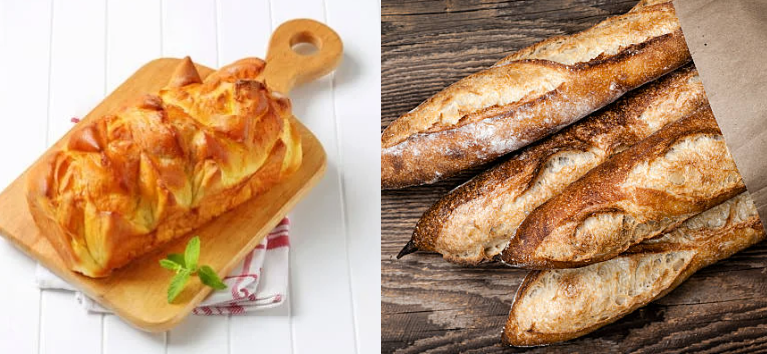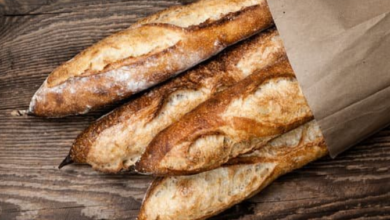Brioche Vs. Baguette: The Great French Bread Showdown

What To Know
- Baguettes are typically made with a simple dough of flour, water, salt, and yeast, resulting in a neutral flavor that complements a wide range of dishes.
- Baguette dough is simple and contains only flour, water, salt, and yeast, resulting in a neutral flavor and a crispy crust.
- If you prefer a simple and versatile bread with a crispy crust and a neutral flavor, baguette is the way to go.
In the realm of French baking, two bread varieties stand out as culinary icons: the rich and buttery brioche and the long, thin baguette. Both are deeply ingrained in French culture and cuisine but offer distinct flavors, textures, and purposes. This blog post delves into the fascinating world of brioche vs baguette, exploring their unique characteristics, similarities, and differences to determine which one emerges as the champion.
Brioche: The Golden Gem of French Pastries
Brioche, with its golden-brown crust and fluffy, buttery interior, is a quintessential French pastry that has captured hearts worldwide. Its name derives from the Old French word “broyer,” meaning “to knead,” hinting at the labor-intensive process that goes into its creation.
Characteristics of Brioche:
- Rich Dough: Brioche dough is enriched with a generous amount of butter, eggs, and milk, resulting in a luxurious, velvety texture.
- Sweetness: Brioche often contains sugar, making it slightly sweet, although some variations may be less sweet or even savory.
- Versatile Shape: Brioche can be shaped into various forms, including individual rolls, braids, and loaves, making it a versatile bread for different occasions.
Baguette: The Long and Lean French Classic
The baguette, with its crisp crust and airy crumb, is a symbol of French bread-making excellence. Its elongated shape, often resembling a stick, has become synonymous with French cuisine.
Characteristics of Baguette:
- Crust and Crumb: The baguette’s crust is thin and crispy, while the crumb is light and airy with large holes, creating a delightful contrast in texture.
- Neutral Flavor: Baguettes are typically made with a simple dough of flour, water, salt, and yeast, resulting in a neutral flavor that complements a wide range of dishes.
- Versatile Use: Baguettes are highly versatile, serving as the perfect accompaniment to soups, salads, sandwiches, or simply enjoyed on their own.
Similarities Between Brioche and Baguette
Despite their distinct characteristics, brioche and baguette share some common ground:
- French Origin: Both brioche and baguette originate from France, where they hold a prominent place in the country’s culinary heritage.
- Yeast-Based: Both breads rely on yeast as the leavening agent, resulting in a light and airy texture.
- Flour as the Base: Both brioche and baguette use wheat flour as their primary ingredient, although brioche may incorporate additional ingredients like butter and eggs.
Differences Between Brioche and Baguette
The key differences between brioche and baguette lie in their composition, texture, flavor, and usage:
Composition:
- Brioche: Brioche dough is enriched with butter, eggs, and milk, giving it a rich and luxurious texture.
- Baguette: Baguette dough is simple and contains only flour, water, salt, and yeast, resulting in a neutral flavor and a crispy crust.
Texture:
- Brioche: Brioche has a soft, fluffy, and buttery texture due to the high-fat content.
- Baguette: Baguette has a crispy crust and a light, airy crumb with large holes, creating a contrasting texture.
Flavor:
- Brioche: Brioche has a slightly sweet flavor due to the addition of sugar, making it suitable for both sweet and savory dishes.
- Baguette: Baguette has a neutral flavor, making it a versatile accompaniment to various dishes without overpowering their flavors.
Usage:
- Brioche: Brioche is often used in pastries and desserts, such as French toast, pain au chocolat, and brioche buns for burgers.
- Baguette: Baguette is commonly used as a sandwich bread, served with soups, salads, or enjoyed on its own.
Which One Should You Choose: Brioche or Baguette?
The choice between brioche and baguette depends on your personal preference and the intended use:
- For a Rich and Buttery Treat: If you crave a decadent pastry with a sweet flavor, brioche is the perfect choice.
- For a Crisp and Neutral Bread: If you prefer a simple and versatile bread with a crispy crust and a neutral flavor, baguette is the way to go.
- For Sandwiches and Accompaniments: Baguette’s neutral flavor and crispy crust make it an ideal choice for sandwiches and as an accompaniment to soups and salads.
- For Pastries and Desserts: Brioche’s rich and buttery texture makes it perfect for pastries, French toast, and sweet dishes.
Baking Brioche and Baguette at Home
If you’re feeling adventurous, you can try baking brioche and baguette at home. Here are some tips to ensure success:
- Use High-Quality Ingredients: Both brioche and baguette require high-quality ingredients to achieve the best results. Use fresh, active yeast, bread flour, and unsalted butter for brioche. For baguette, use high-gluten flour and cold water.
- Follow the Recipe Carefully: Brioche and baguette doughs have specific techniques and timings that need to be followed precisely. Make sure you measure ingredients accurately and follow the instructions step by step.
- Practice Patience: Baking brioche and baguette takes time and patience. Allow the dough to rise properly and don’t rush the baking process.
Wrapping Up: The Brioche vs Baguette Debate
In the battle of brioche vs baguette, there is no clear winner. Both breads have their unique merits and are beloved by bread enthusiasts worldwide. Brioche, with its rich and buttery flavor, is a perfect choice for pastries and sweet dishes. Baguette, with its crispy crust and neutral flavor, is a versatile bread that complements various dishes. Ultimately, the choice between brioche and baguette comes down to personal preference and the intended use.
Frequently Discussed Topics
1. Q: Can I substitute brioche for baguette in a sandwich?
A: While brioche can be used as a substitute for baguette in a sandwich, its soft texture may not hold up as well as the crispy baguette.
2. Q: Can I use baguette dough to make brioche?
A: No, baguette dough cannot be used to make brioche. Brioche dough requires a higher fat content and a different fermentation process.
3. Q: Which bread is better for French toast, brioche or baguette?
A: Brioche is the better choice for French toast due to its rich and buttery flavor and soft texture, which soak up the egg mixture well.
4. Q: How long can I store brioche and baguette?
A: Brioche and baguette can be stored at room temperature for a few days. For longer storage, they can be frozen for up to a month.
5. Q: Can I make brioche and baguette gluten-free?
A: Gluten-free versions of brioche and baguette can be made using alternative flours such as almond flour, coconut flour, or gluten-free flour blends.
